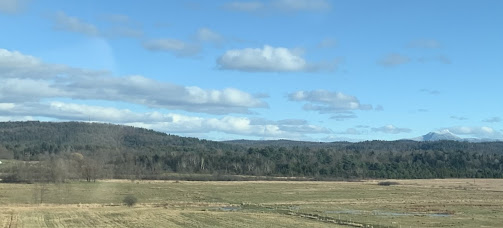Now a man will eat his heart, if ever, now while the earth is bare, barren and cheerless, and we have the coldness of winter without the variety of ice and snow; but methinks the variety and compensation are in the stars now. How bright they are now by contrast with the dark earth!
The days are short enough now. The sun is already setting before I have reached the ordinary limit of my walk, but the 21st of next month the day will be shorter still by about twenty-five minutes. In December there will be less light than in any month in the year.
It is too cold to-day to use a paddle; the water freezes on the handle and numbs my fingers.
Lychopodium, November 27, 2024
Checkerberries and partridge-berries are both numerous and obvious now.
H. D. Thoreau, Journal, November 27, 1853
Now a man will eat his heart, if ever, now while the earth is bare, barren and cheerless. .See November 1, 1852 ("In November, a man will eat his heart, if in any month. "); November 13, 1851 ("Such a day as will almost oblige a man to eat his own heart. A day in which you must hold on to life by your teeth."); November 14, 1858 ("I walk on frozen ground two thirds covered with a sugaring of dry snow, and this strong and cutting northwest wind makes the oak leaves rustle dryly enough to set your heart on edge.");November 25, 1857 (“November Eatheart, — is that the name of it? Not only the fingers cease to do their office, but there is often a benumbing of the faculties generally. You can hardly screw up your courage to take a walk when all is thus tightly locked or frozen up and so little is to be seen in field or wood. ”) See also A Book of the Seasons, by Henry Thoreau, November Days ;
H. D. Thoreau, Journal, November 27, 1853
Now a man will eat his heart, if ever, now while the earth is bare, barren and cheerless. .See November 1, 1852 ("In November, a man will eat his heart, if in any month. "); November 13, 1851 ("Such a day as will almost oblige a man to eat his own heart. A day in which you must hold on to life by your teeth."); November 14, 1858 ("I walk on frozen ground two thirds covered with a sugaring of dry snow, and this strong and cutting northwest wind makes the oak leaves rustle dryly enough to set your heart on edge.");November 25, 1857 (“November Eatheart, — is that the name of it? Not only the fingers cease to do their office, but there is often a benumbing of the faculties generally. You can hardly screw up your courage to take a walk when all is thus tightly locked or frozen up and so little is to be seen in field or wood. ”) See also A Book of the Seasons, by Henry Thoreau, November Days ;
It is too cold to-day to use a paddle. See November 24, 1860 (“Fingers are so benumbed that you cannot open your jack-knife.”)
Checkerberries and partridge-berries are both numerous and obvious now. See November 16, 1850 (“The partridge-berry leaves checker the ground on the side of moist hillsides in the woods. Are they not properly called checker-berries ?”) ; November 19, 1850 ("Now that the grass is withered and the leaves are withered or fallen . . . the partridge-berry and checkerberry, and winter-green leaves even, are more conspicuous.”); cember 3, 1853 ("The still green Mitchella repens and checkerberry in shelter, both with fruit"); See also A Book of the Seasons, by Henry Thoreau, Partridge-berry (Mitchella Repens)
Note "Checkerberry" is another name for American wintergreen (Gaultheria procumbens). See Checkerberry cum Wintergreen. What HDT calls “wintergreen” is Chimaphila umbellata, a/k/a pipsissewa,.See July 3, 1852 ("The Chimaphila umbellata, wintergreen, must have been in blossom some time.”); November 16, 1858 (“Methinks the wintergreen, pipsissewa, is our handsomest evergreen, so liquid glossy green and dispersed almost all over the woods.”)
November 27. See A Book of the Seasons, by Henry Thoreau, November 27
The bare barren earth
cheerless without ice and snow –
but how bright the stars.
A Book of the Seasons, by Henry Thoreau, The earth is bare, barren and cheerless.
A Book of the Seasons, by Henry Thoreau
"A book, each page written in its own season,
out-of-doors, in its own locality."
~edited, assembled and rewritten by zphx © 2009-2024
https://tinyurl.com/hdt-531127














